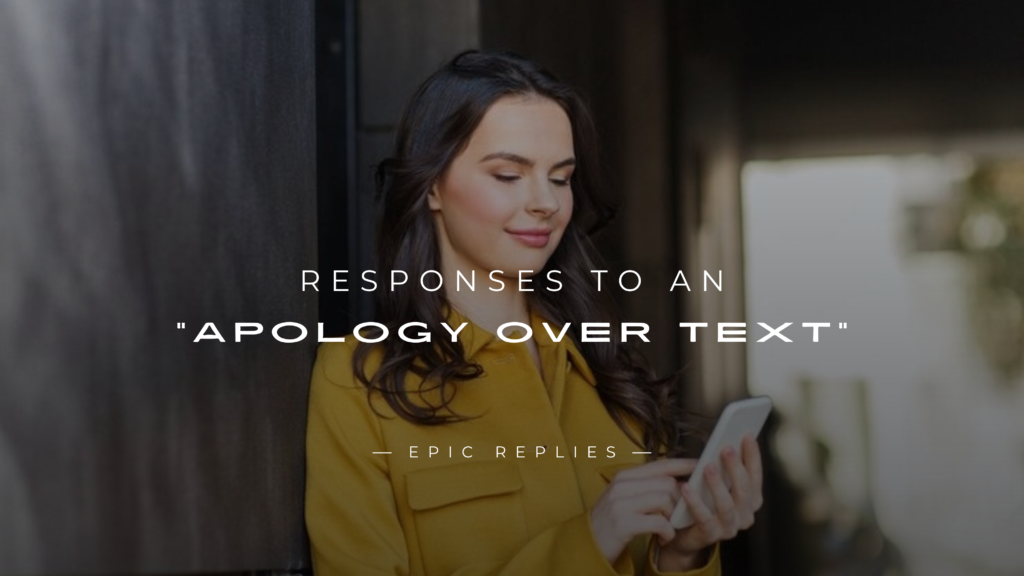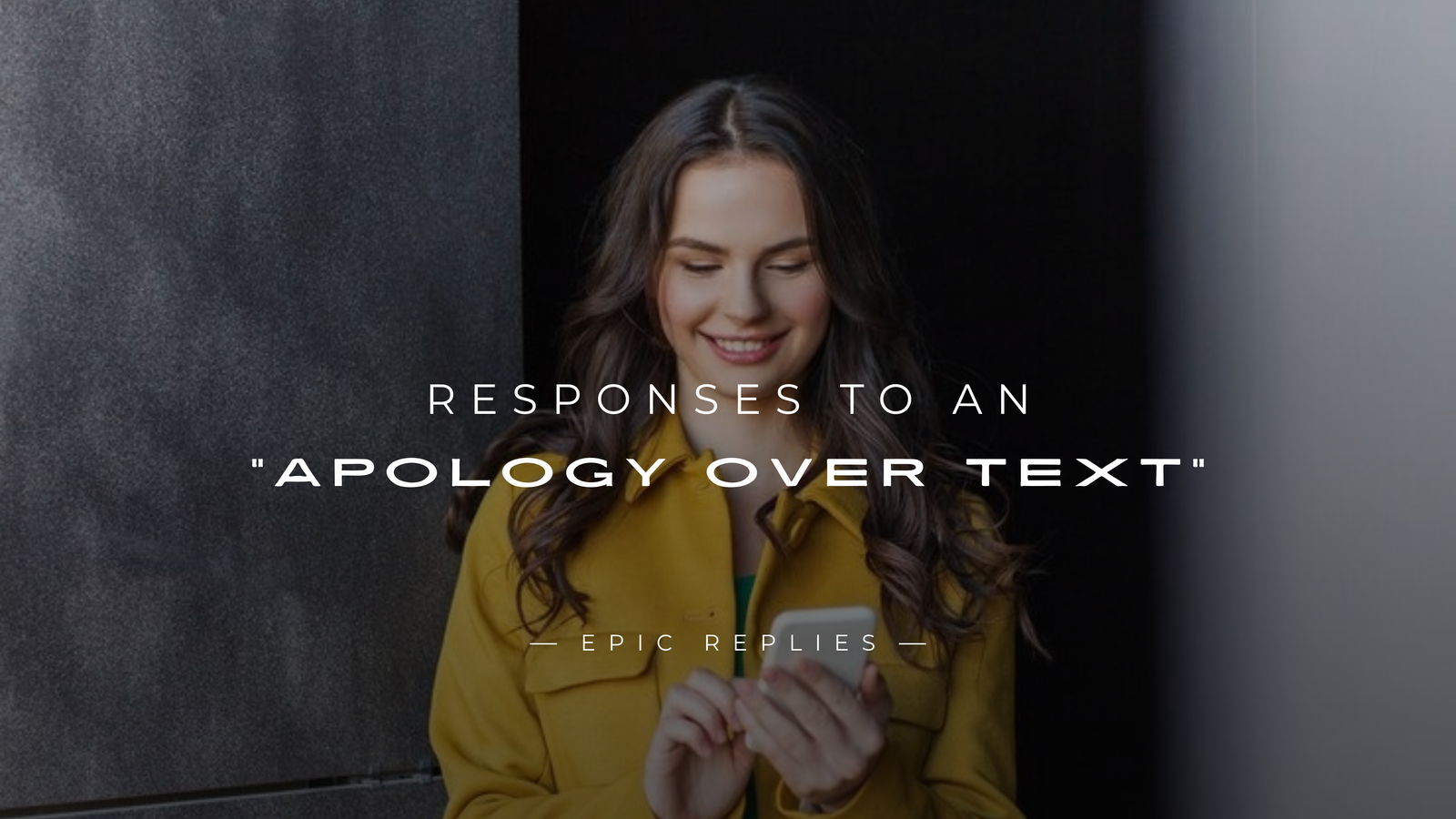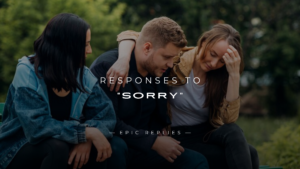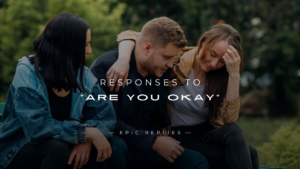When someone sends you an apology over text, it can stir up a mix of emotions. You might feel relief that they finally said sorry, confusion about what they truly mean, or hesitation about how to reply. Text messages make communication fast, but they also make emotional moments like apologies harder to interpret. Unlike face-to-face conversations, there are no facial expressions, no tone of voice, and no body language to guide you. So, how do you know if the apology is genuine? And how should you respond? Whether the message comes from a friend, a partner, or someone at work, this guide will walk you through how to understand and respond to an apology over text with maturity, clarity, and emotional balance.

250+ Responses to an “Apology Over Text”
Forgiving & Reassuring
- It’s okay, I know you didn’t mean to hurt me.
- Thank you for apologizing, we’re good.
- I appreciate you owning up to it, no hard feelings.
- Everyone makes mistakes, it’s fine.
- I forgive you, let’s just move forward.
- I know your heart, and I know you’re sorry.
- You don’t have to worry, I’ve already let it go.
- It means a lot that you said sorry, we’re okay.
- Don’t stress over it, things happen.
- It’s all in the past now, let’s focus on better days.
Partially Forgiving
- I accept your apology, but it still hurts a bit.
- I get that you’re sorry, I just need a little time.
- I appreciate it, but trust will take some rebuilding.
- Thanks for saying that, I’m trying to move on.
- I hear you, but it’s not easy to just forget.
- I know you didn’t mean it, but it really affected me.
- I forgive you, but I’m still processing everything.
- That means a lot, but I need some space right now.
- I’m not angry anymore, just a bit disappointed.
- I believe you’re sorry, I just need to see some change.
Unforgiving / Dismissive
- I’ve heard this before, I’m done.
- Saying sorry doesn’t fix everything.
- I don’t think I can accept that right now.
- I’m over it, but not in a forgiving way.
- You can keep your apology, it’s too late.
- Words don’t mean much anymore.
- I don’t want to talk about it.
- You made your choice, now live with it.
- I don’t feel like this apology is genuine.
- I’m not ready to forgive, maybe never will be.
Neutral / Polite
- Thanks for your message.
- I appreciate you reaching out.
- Noted, I understand.
- Thank you for apologizing.
- Okay, I get it.
- That’s fine, thanks for letting me know.
- Alright, no worries.
- I hear you, thank you.
- It’s okay, let’s leave it at that.
- I appreciate your honesty.
Appreciative
- Thank you for being mature enough to apologize.
- I really appreciate your honesty.
- It takes courage to say sorry, and I respect that.
- Thanks for reaching out, that means a lot.
- I value that you took the time to make things right.
- I’m grateful for your message.
- You didn’t have to say that, but I’m glad you did.
- It shows a lot of growth that you apologized.
- That was kind of you to acknowledge what happened.
- Thank you for your sincerity, it means something.
Empathetic
- I can imagine it wasn’t easy for you to say that.
- I know you didn’t mean to hurt me.
- I understand where you were coming from.
- I can see you’re really trying, and that matters.
- I know this situation was tough for both of us.
- I appreciate your honesty, and I get it.
- It’s okay, we all mess up sometimes.
- I know your intentions weren’t bad.
- I understand, I’ve made similar mistakes too.
- I can tell you’re genuinely sorry, and that matters to me.
Hurt / Vulnerable
- I hear your apology, but I’m still really hurt.
- I want to forgive you, but it’s hard.
- I didn’t expect that from you, and it still stings.
- I’m trying to move on, but I keep replaying it in my head.
- I need some time to heal, even though I appreciate your message.
- I don’t know how to feel right now.
- I care about you, but what happened really broke my trust.
- It means something that you said sorry, but it doesn’t erase the pain.
- I feel conflicted, I know you’re sorry but I’m still upset.
- I wish things hadn’t gone this way.
Angry / Confrontational
- Saying sorry doesn’t undo what you did.
- You think an apology makes it all okay?
- I’m tired of words, show me change.
- It’s easy to say sorry after the damage is done.
- I’ve heard this before, I’m not buying it.
- You had a choice, and you still hurt me.
- You don’t get to apologize and expect everything to be fine.
- I’m angry, and a text doesn’t fix that.
- If you really meant it, you’d prove it.
- You don’t get to just say sorry and walk away clean.
Disappointed but Hopeful
- I’m still disappointed, but I believe you’re sincere.
- I wish it hadn’t happened, but I want to move forward.
- I’m hurt, but I do appreciate you owning up to it.
- It’ll take time, but I’m willing to try.
- I believe in second chances, so let’s see how things go.
- I care about you, even though I’m let down.
- I didn’t expect that from you, but I hope we can rebuild.
- I’m not okay yet, but I want to be.
- I’m sad about what happened, but your apology means something.
- It’ll take effort, but I’m open to making things better.
Cold / Detached
- Okay.
- Got it.
- Thanks for the message.
- Alright.
- I understand.
- Noted.
- Fine.
- Appreciate it.
- Okay, I read it.
- Sure.
Seeking Clarification
- Can you tell me what made you realize you needed to apologize?
- What exactly are you sorry for?
- I appreciate the apology, but can we talk about what happened?
- I just want to understand why it happened.
- Are you apologizing because you mean it or just to move on?
- I’m confused about what you meant by that.
- Can you explain what changed your mind?
- I need a little more honesty to really accept this.
- What made you decide to reach out now?
- I just want to make sure we’re on the same page.
Setting Boundaries
- I accept your apology, but I need space.
- Thank you, but I’m not ready to talk more about it.
- I appreciate it, but please don’t bring it up again.
- I forgive you, but things can’t go back to how they were.
- I hear you, but I need time for myself.
- Thanks for saying sorry, but I’m keeping my distance for now.
- I’m not angry, I just need peace.
- I understand, but let’s keep our communication limited.
- I don’t want to dwell on it, so I’m stepping back.
- I wish you well, but I need to protect my energy.
Rebuilding Trust
- I accept your apology, but trust takes time.
- I’m willing to move forward if we both put in effort.
- I appreciate the honesty, now let’s focus on actions.
- It’ll take more than words, but I want to try.
- Thank you, I’m open to rebuilding this slowly.
- I believe in giving people chances, let’s start small.
- I want to trust you again, just show me consistency.
- I’ll forgive, but I won’t forget what I learned.
- This means something, let’s work on making it better.
- I’m willing to move forward if things truly change.
Deflecting / Changing Subject
- It’s fine, anyway how have you been?
- No worries, let’s not talk about it.
- Okay, so did you finish that thing we talked about?
- Thanks, but I’d rather just move on.
- It’s all good, what’s new with you?
- Alright, let’s just focus on something else.
- I appreciate it, so what are your plans this weekend?
- No big deal, I’m over it.
- Don’t worry, how’s everything else going?
- Yeah, it’s okay, anyway let’s change the topic.
Humorous / Lighthearted
- Well, that’s one way to earn forgiveness points.
- I was waiting for that text, took you long enough.
- You’re lucky I’m nice enough to forgive.
- I’ll let it slide this time, but you owe me coffee.
- It’s fine, I can’t stay mad forever.
- Apology accepted, now buy me pizza.
- Wow, an apology that actually sounds real. Impressed.
- You’re forgiven, but only because I’m feeling generous.
- I guess I can forgive you this once.
- Okay fine, I’ll stop giving you the silent treatment.
Reflective / Philosophical
- We all make mistakes, what matters is learning from them.
- It’s strange how something small can teach such a big lesson.
- I believe everything happens for a reason, even this.
- I appreciate your message, it shows growth.
- I think this helped both of us understand things better.
- Sometimes pain is part of the process of healing.
- I’ve been thinking about it too, and I get it now.
- Life’s messy, but at least we’re trying to do better.
- I believe mistakes can help us grow if we’re honest about them.
- This showed me how much communication matters.
Silent Acceptance
- Thanks.
- Okay.
- I understand.
- Alright.
- Got your message.
- Appreciated.
- Noted.
- Fine.
- I see.
- Alright, let’s move on.
Reciprocal Apology
- Thank you, and I’m sorry too.
- I appreciate that, I should’ve handled things better as well.
- I’m sorry for my part in it too.
- It means a lot, and I want to apologize too.
- I wasn’t perfect either, so thank you for reaching out.
- I should’ve said sorry sooner, so I’m saying it now.
- I know I hurt you too, and I’m sorry.
- I’m glad you texted, I wanted to apologize too.
- You’re right, and I owe you an apology as well.
- Let’s both let it go and start fresh.
Redirecting / Moving On
- It’s okay, let’s just focus on the present.
- Thanks for saying that, I’d rather not dwell on it.
- No worries, I’m ready to move forward.
- I appreciate it, let’s not bring it up again.
- It happened, it’s done, let’s move on.
- Thanks for clearing the air, I’m good now.
- All good, let’s just keep things positive.
- I understand, let’s start fresh from here.
- It’s fine, I’d rather focus on what’s ahead.
- I appreciate your message, let’s move past it.
Testing / Guarded
- I hear you, but time will tell.
- I appreciate the apology, but I’m not sure yet.
- I want to believe you, but I’ve been hurt before.
- It sounds sincere, I just need to see it in your actions.
- I’ll take your word for now.
- Thanks for saying that, but I’m keeping my guard up.
- We’ll see how things go.
- I accept it, but I’m still cautious.
- I’m not ready to fully trust yet, but I’m open.
- Words are a start, but consistency matters more.
Affectionate & Loving
- I forgive you, love. We’ll be okay.
- Thank you for saying that, I love you.
- I know you didn’t mean it, come here.
- It’s alright, I just care about us.
- You mean too much to me to stay upset.
- I forgive you, and I still love you just as much.
- It’s okay, we’ll get through this together.
- Your apology means a lot, I’ve missed you.
- I love you, and that’s stronger than this mistake.
- I’m just glad we’re talking again, I really care about you.
Professional & Formal
- Thank you for addressing the issue.
- I appreciate your acknowledgment and apology.
- Your message is noted and appreciated.
- Thank you for taking responsibility.
- I accept your apology and look forward to working positively.
- I appreciate your professionalism in reaching out.
- Apology accepted, let’s move ahead productively.
- Thank you for clarifying and taking accountability.
- I acknowledge your apology and understand.
- Thank you for your message, let’s maintain good communication going forward.
Supportive & Encouraging
- I appreciate your honesty, it takes courage to admit mistakes.
- I know it wasn’t easy to say that, I’m proud of you.
- Thank you for being open, that shows a lot of growth.
- We all mess up, what matters is that you’re trying.
- I believe in you, don’t be too hard on yourself.
- I can see you’re really trying, that means something.
- It’s okay, I know your heart’s in the right place.
- You’ve come a long way, keep growing.
- I appreciate how genuine you’ve been about this.
- Mistakes happen, what matters is that you care enough to fix it.
Withdrawn / Ending Contact
- I appreciate your message, but I think it’s best we go our separate ways.
- Thank you for apologizing, I just don’t want to continue this anymore.
- I understand, but I’m done revisiting the past.
- I accept your apology, but I’m choosing to move on alone.
- I’m letting this go, but I can’t stay in touch.
- Thank you for the closure, I wish you well.
- I’ve forgiven you, but I don’t want to keep this connection.
- I’m at peace with it, but I’m walking away.
- I appreciate the honesty, but I’m closing this chapter.
- No hard feelings, but this is goodbye.
Reconciliatory & Hopeful
- I’m glad we talked, this feels like a fresh start.
- Thank you, I think we can rebuild this.
- I believe we can work things out if we both try.
- Your apology means a lot, I want to make things better.
- Let’s take it one step at a time and see where it goes.
- I’m hopeful this can bring us closer again.
- It feels good to have this off our chests, let’s move forward.
- I believe in second chances, and I want to try again.
- I appreciate your message, I think we can make it work.
- I’m ready to move forward together, no more looking back.
Why Apologies Over Text Are So Common Today
In a world where texting has become the main form of communication, it’s no surprise that apologies often happen through a screen. People text apologies because it feels safer. It’s easier to type “I’m sorry” than to look someone in the eyes and say it. For many, texting gives them the courage to express regret without the fear of confrontation. However, that same convenience can make it difficult to know whether the apology is heartfelt or simply a quick fix. When emotions are involved, the digital barrier can cause misunderstandings. You might wonder if they truly mean it or if they just want to move past the issue quickly. An apology over text might feel impersonal, but it still carries meaning. What matters most is the intention behind the words.
The Challenge of Understanding Emotions in Text Messages
Text messages can easily be misread because they lack tone and emotion. A simple sentence like “I’m sorry for what happened” can come across as sincere or completely indifferent, depending on how you read it. The absence of voice inflection and facial cues creates emotional ambiguity. In person, you can feel sincerity in someone’s voice. You can see regret in their eyes. Over text, you only see typed words. That’s why it’s essential to take a step back before reacting emotionally. Try to analyze not just what they said, but also how and when they said it. If they wrote a long, thoughtful message addressing what went wrong, it’s probably genuine. But if the message feels short, vague, or dismissive, it may not hold much emotional weight. Understanding this difference will help you respond wisely.
What an Apology Over Text Really Means
An apology over text can carry several meanings depending on the person’s emotional maturity, guilt level, and comfort with confrontation. Let’s explore the most common types of apologies you might receive.
- 1. Genuine Apology
This type of apology comes from a sincere place. The sender acknowledges their mistake, accepts responsibility, and expresses remorse. They often use clear, heartfelt language that reflects empathy and accountability. Example: “I realize I hurt you with what I said, and I feel terrible about it. You didn’t deserve that, and I want to make it right.” A genuine apology focuses on the person who was hurt, not the one apologizing. It shows understanding and a desire to rebuild trust.
- 2. Half-Hearted or Insincere Apology
Some apologies sound polite but don’t carry real accountability. They often use vague phrases like “I’m sorry if you were upset” instead of owning the mistake. This kind of apology shifts the focus away from their actions and onto your reaction. Example: “Sorry if I said something that bothered you.” This is not an apology; it’s deflection. It implies that your feelings are the problem, not their behavior.
- 3. Manipulative or Guilt-Driven Apology
Sometimes people use apologies to manipulate emotions or avoid consequences. Instead of showing empathy, they try to make you feel guilty for being hurt. Example: “I guess I’m just a terrible person, and nothing I do will ever be good enough.” This kind of message is emotionally manipulative. It shifts attention away from accountability and forces you to comfort them instead.
Things to Consider Before Responding to an Apology Over Text
Before you type your reply, pause. Don’t let the emotion of the moment control your reaction. Consider these key factors before responding.
- 1. Reflect on How You Feel
Take a moment to check in with yourself. Are you still angry? Hurt? Confused? You don’t have to respond right away. It’s completely okay to take time to gather your thoughts. Responding too soon can lead to saying things you don’t truly mean. Give yourself permission to feel before you reply.
- 2. Analyze the Message for Sincerity
Read their message carefully. Are they acknowledging what they did wrong? Are they expressing empathy and taking responsibility? A genuine apology usually includes phrases like “I was wrong,” “I hurt you,” or “I take full responsibility.” If their message lacks any of those elements, it may not be genuine.
- 3. Consider the Timing
Did the apology come immediately after the conflict or weeks later? Timing can reveal a lot about sincerity. Immediate apologies can sometimes be reactive, while delayed ones might show reflection and growth. However, waiting too long without any communication may also feel inconsiderate. Balance is key.
How to Respond to an Apology Over Text
The way you respond should reflect how you feel, what you want moving forward, and the nature of your relationship with the person. Here are three common situations and how to handle them.
- 1. When You Want to Accept the Apology
If you feel the apology is sincere and you’re ready to forgive, keep your reply kind and direct. Avoid overexplaining or reopening old wounds. Examples: “Thank you for apologizing. I really appreciate it and I forgive you.” “It means a lot that you took the time to reach out. I’m glad we can move forward.” “I know everyone makes mistakes. I value our relationship and accept your apology.” A gentle and warm response helps close the emotional gap and rebuild trust.
- 2. When You Need More Time to Process
If you’re not ready to forgive, that’s completely fine. You can acknowledge the apology without committing to forgiveness yet. Examples: “I appreciate your apology. I just need a bit of time to process everything before I respond fully.” “Thanks for reaching out. I’m still sorting through my feelings, but I hear what you’re saying.” This response shows maturity and self-awareness. You’re acknowledging their effort while honoring your emotional needs.
- 3. When You Choose Not to Accept the Apology
If the apology feels fake, manipulative, or dismissive, you’re under no obligation to accept it. You can remain polite while setting firm boundaries. Examples: “I see that you’re sorry, but I’m not ready to forgive right now.” “I don’t feel that your message addresses what really happened, and I need honesty to move forward.” “I appreciate the gesture, but I don’t feel comfortable continuing this conversation right now.” This type of response shows strength, clarity, and respect for yourself.
Common Mistakes People Make When Responding
Many people rush their response to an apology over text because they feel pressured to appear kind or forgiving. Here are common mistakes to avoid. Responding Too Quickly: Immediate replies can lead to emotional reactions. Take time to breathe and think before you answer. Ignoring Your Own Feelings: Don’t accept an apology just to make things easier. If you’re still upset, acknowledge it. Your emotions deserve attention too. Being Passive-Aggressive: Avoid sarcastic or dismissive remarks like “Sure, whatever” or “Guess that’s supposed to fix everything.” These comments add more tension and close the door to real healing. Overanalyzing Every Word: While it’s good to evaluate sincerity, don’t overthink every emoji or sentence. Focus on the core message rather than tiny details.
The Importance of Emotional Intelligence
Handling an apology over text requires emotional intelligence the ability to manage your emotions while understanding the other person’s perspective. This means finding a balance between empathy and honesty. Read Between the Lines: Notice if they use “I” statements or “you” statements. Someone who says “I was wrong” takes ownership. Someone who says “You took it the wrong way” avoids responsibility. Balance Empathy with Boundaries: You can be kind without allowing people to take advantage of you. Empathy doesn’t mean saying yes to everything; it means understanding feelings while staying true to your values.
Examples of Responses for Different Relationships
Different relationships require different tones and levels of emotion when responding to an apology over text.
- If the Apology Comes from a Close Friend
“Thanks for your apology. I value our friendship and I know this situation was tough for both of us. I forgive you, and I hope we can rebuild the trust between us.” This response communicates forgiveness without minimizing the hurt.
- If the Apology Comes from a Romantic Partner or Ex
“I appreciate your apology. I care about you, but actions speak louder than words. I need to see genuine effort before I can truly forgive.” This shows honesty, love, and self-respect.
- If the Apology Comes from a Coworker or Acquaintance
“Thanks for reaching out. I appreciate the apology. Let’s keep things professional and positive moving forward.” This keeps the tone respectful and appropriate for professional settings.
The Role of Forgiveness After an Apology Over Text
Forgiveness is a personal journey. It doesn’t mean forgetting what happened or allowing the same behavior again. It means letting go of resentment for your own peace. An apology over text can be the start of healing, but true closure often comes from deeper communication. Sometimes, forgiveness happens in your heart even if you never send a reply. You can choose peace without reopening the conversation.
When to Take the Conversation Offline
Some apologies need more than words on a screen. If the situation involves serious emotional pain, betrayal, or misunderstanding, it’s better to talk in person. Face-to-face conversations allow tone, empathy, and body language to fill the gaps that texting leaves behind. You can say something like: “I appreciate your apology. I think this is something we should talk about in person when we both feel ready.” This approach shows maturity and creates space for real healing.
How to Protect Your Peace While Responding
Protecting your peace means prioritizing emotional safety. Not every apology deserves a detailed response. Sometimes silence is your boundary. If replying will reopen old wounds or drain your energy, it’s okay not to respond. Always remember that forgiveness doesn’t mean reconciliation. You can forgive someone in your heart and still choose distance if that protects your well-being.
How to Know if Their Apology is Genuine
Here are signs that an apology over text is likely sincere: They clearly state what they did wrong. They use empathetic language like “I understand how I hurt you.” They avoid making excuses. They express a desire to make things right. They show changed behavior afterward. If their apology lacks these qualities, be cautious. Empty words are easy to type; real remorse shows up in consistent actions.
Why Closure Matters After an Apology Over Text
Closure is the emotional resolution that lets you move forward. Whether you decide to accept or reject the apology, closure gives you inner peace. It’s not about changing the past but about freeing yourself from emotional baggage. Even if the apology feels incomplete, you can create your own closure by reflecting, setting boundaries, and deciding what’s best for your future.
Conclusion
Apologies over text can be tricky they often lack the tone, emotion, and sincerity we’d feel in person. But with the right response, you can express how you truly feel while keeping the conversation meaningful or even light-hearted. Whether you choose to forgive, flirt, or stay firm, the best reply always reflects your personality and boundaries. Remember, good communication is key to any healthy relationship. And if you enjoyed exploring these creative apology responses, you’ll also love our guide on 250+ Best Responses to “I Miss You Too” Text perfect for those heartfelt moments when emotions run deep.
FAQs
Q. Should I always reply to an apology over text?
Not always. If the apology is sincere, replying can help both sides find closure. But if it feels forced or manipulative, it’s okay not to respond.
Q. How long should I wait before replying?
Take as much time as you need. It’s better to respond thoughtfully than to send an impulsive message.
Q. What if the apology feels fake?
You don’t owe forgiveness to anyone. If it doesn’t feel genuine, politely acknowledge the message or ignore it completely.
Q. Can I forgive someone without replying?
Yes. Forgiveness happens within you. You can let go of resentment without ever sending a message.
Q. Is it okay to ask for a face-to-face apology instead of text?
Absolutely. If the matter is serious, asking for an in-person talk shows that you value meaningful communication and accountability.




